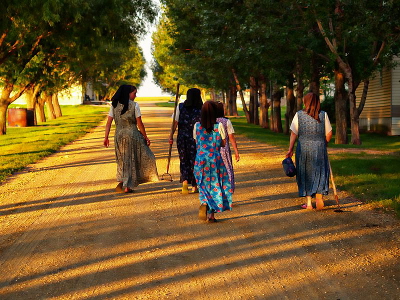
Religion and community
 Although I'll leave Diamond's
larger description of religion for you to read about on your own, I did
want to write about one factor that the author believes has made
religion a staple of traditional societies. As I mentioned
previously, it's very important to separate "us" from "them" in
traditional societies since strangers are potentially dangerous, and
religion helps cement that distinction. Religion is usually
expensive either in terms of time or money, so your willingness to jump
through those hoops serves as evidence of your commitment to support
others of your religion.
Although I'll leave Diamond's
larger description of religion for you to read about on your own, I did
want to write about one factor that the author believes has made
religion a staple of traditional societies. As I mentioned
previously, it's very important to separate "us" from "them" in
traditional societies since strangers are potentially dangerous, and
religion helps cement that distinction. Religion is usually
expensive either in terms of time or money, so your willingness to jump
through those hoops serves as evidence of your commitment to support
others of your religion.
Why is this relevant to
homesteaders? Diamond reports that intentional communities are
much more likely to stand the test of time if they're based around a
central religion. One study examined the communes that popped up
in the U.S. in the 1970s and found that secular communities dissolved
four times faster than those with a religious focus. Similarly,
religious kibbutzim in Israel have been much more successful than
secular ones.
That observation reminded me of an interesting series of posts on Club Orlov,
assessing which intentional communities survive and which fail.
Both Diamond and Orlov touch on the success of the Hutterites, a
religious group related to the Amish who live in small agricultural
communities throughout the western U.S. and Canada. It looks like I am Hutterite should move its way up to the top of my reading list.
| This post is part of our The World Until Yesterday lunchtime series.
Read all of the entries: |
Want more in-depth information? Browse through our books.
Or explore more posts by date or by subject.
About us: Anna Hess and Mark Hamilton spent over a decade living self-sufficiently in the mountains of Virginia before moving north to start over from scratch in the foothills of Ohio. They've experimented with permaculture, no-till gardening, trailersteading, home-based microbusinesses and much more, writing about their adventures in both blogs and books.
Want to be notified when new comments are posted on this page? Click on the RSS button after you add a comment to subscribe to the comment feed, or simply check the box beside "email replies to me" while writing your comment.

In religoius groups, especially small and non-mainstream ones you are generally not free to leave. Even if the menbers are nominally free to leave, there will be intense social pressure to conform. Additionally, groups like the hutterites and amish don't seem to send their kids to regular primary schools, let alone secundary or teriary education. Leaving them unprepared to build a life outside the group except as unskilled manual labor.
There have been series about amish and hutterites, on Discovery IIRC. I found their lifestyles very depressing. No room for learning and growing. No freedom to choose what you want to do or be.
In my opinion, that is too high a price to pay.
Hi All,
I wonder if the same sorts of things are true in 'closed' countries?
I suspect so.
Maybe free direct satellite internet should come sooner than later?
John
I was actually very interested in intentional communities as a teen. I got to know an Old Order Amish family that welcomed me into their home. I visited a number of times and was given an open invitation to move into their home with them. I also spent several visits with a Hutterian Bruderhof on the east coast. They were at that time communally bound with the old Hutterites but have since split. They actually started in early 19th century Germany.
The Bruderhof actually sends all their kids to the local highschool and requires most of them to get college or university educations out in the world so they get a chance to experience and decided for themselves. The Amish allow their children to experiment a lot with the outside world and their English neighbors. Naturally of course they do want their children to eventually settle at home.
Honestly I still miss the level of community those groups offered and wish it was something I was able to give my own children. I miss what little I experienced and grieve on some level how my natural "hermitness" makes it harder for me to form more of a community IN my own community. Then again that was part of why I chose to not pursue a life in those communities. It was simply too much for me. But I very much admire intentional communities. Right now the closest I come is having a rather large group of my own children and living across the street from my parents and spending a lot of time with them.